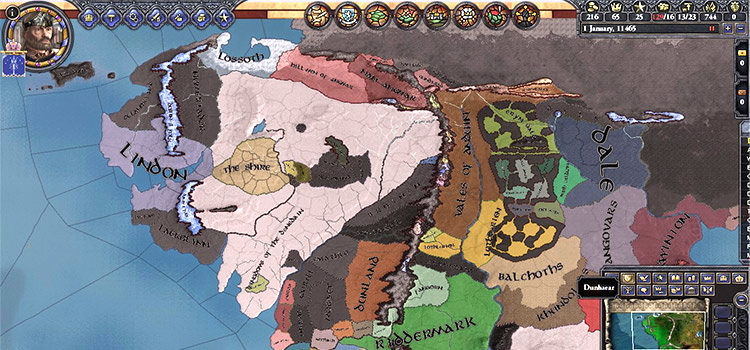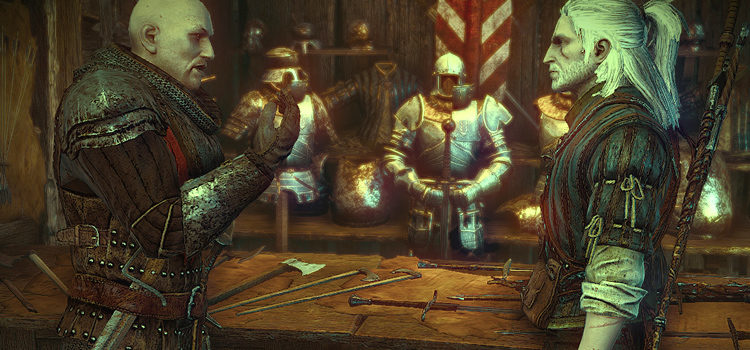Top 10 Best Personality Traits in Crusader Kings 3
This post may contain affiliate links. If you buy something we may get a small commission at no extra cost to you. (Learn more).
Every character in the game gets at least three personality traits when they reach adulthood. These are determined during the character’s education as a child.
Acquiring personality traits while an adult is very rare, as is getting rid of existing ones. For this reason, you should lean on educating your children yourself, even if you are not the best possible tutor. At least you get to impact how their personality develops!
While the game offers bonuses and negatives with all personality traits, some of them objectively do better than others.
This list will attempt to rank the best personality traits based on their stat boosts, relevance in events, their impact on stress, as well as their standing in the eyes of major faiths and cultures.
10. Chaste
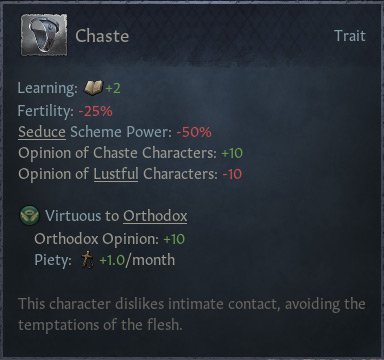
Chastity clutches the last spot on the list mainly due to its lack of negative bonuses and zero stress modifiers. Furthermore, being chaste is a virtue in all Christian faiths except Messalianism. This translates to a free +10 opinion bonus with your vassals.
The reduced fertility is actually an advantage unless your character suffers from other similar modifiers as well. While siring a dozen of children has its applications, you will generally aim at a sweet spot between securing the succession and not fragmenting your realm into a thousand pieces.
The bonus on learning is always welcome when you are your culture’s head.
Just double check if your character follows some obscure faith or has a culture that considers chastity a sin!
9. Ambitious

The ambitious trait provides a +1 to all attributes at the cost of significant opinion penalties of your liege and fellow ambitious characters, as well as a major increase in stress gain.
The opinion malus is usually irrelevant, especially if you are an independent ruler.
But the stress gain can be detrimental to your character if you’re not careful. You should pay far more attention to your stress than usual and always keep it close to zero. A major stress event (death of a loved one) can easily raise your stress level instantly!
The +1 across the board is of course a great bonus, while its impact on event choices is also positive for the most part.
8. Temperate
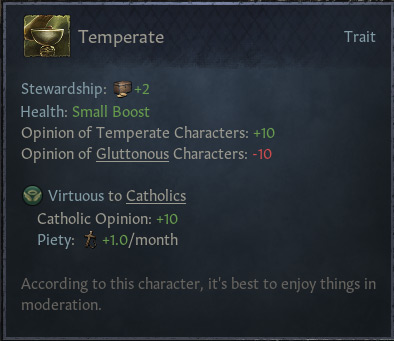
The temperate trait provides a nice bonus to your stewardship and a small health boost. Health boosts are some of the rarest modifiers in the game, and this is arguably the easiest way to grab one.
Well, to be fair, a boost to health can be a double-edged sword. It can be a negative on a character you would rather not play as for long. However, it is far easier to cut one’s life short than prolonging it, hence the trait’s position on the list.
On top of that, temperance is a virtue in almost every single one of the organized religions. From the emerald isle of Ireland all the way to the golden land of the Mon to the far east, the temperate trait will provide you a +10 opinion bonus with all characters.
7. Diligent

The diligent trait provides a nice boost to your diplomacy, stewardship, and learning. However, this comes at a cost of losing half the usual stress from stress-reducing activities.
Generally looked upon with indifference by most faiths, diligence is considered a virtue in some regional ones like Zoroastrianism.
While you will need to manage your stress carefully, the bonuses to core attributes will significantly boost your character’s capabilities. Stress management in these cases will focus around outright avoiding stressful situations rather than alleviating stress.
6. Wrathful
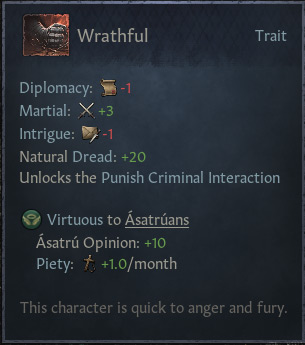
The wrathful trait increases your natural dread and martial attribute significantly, while giving a minor reduction to diplomacy and intrigue. It also gives access to the “Punish Criminal Interaction” which can be very powerful if you are a strong duelist.
The malus to intrigue and diplomacy is a minor annoyance at most.
The extra martial on the other hand will boost your military capabilities significantly.
And the +20 natural dread synergizes very well with military and intrigue lifestyles, as well as with the unique interaction wrathful provides access to.
Surprisingly, wrath is not considered a sin in Abrahamic religions. Though it’s a sin in all Eastern religions, devaluing it by quite a lot when playing in India or Tibet.
5. Sadistic
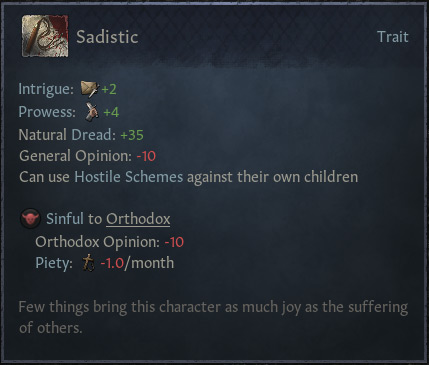
The sadistic trait provides a significant boost to prowess and a decent increase to your intrigue. A massive +35 to natural dread paired with a -10 general opinion nudges you towards a tyrannical playstyle.
Considered a sin by many faiths, especially Christian ones, sadism provides an extra -10 opinion with many characters. Forget any hopes of being liked by your vassals if you have this trait in Europe. Ruling through fear will be your only option!
Sadism provides you with stress reduction from murders and executions, making particularly murderous characters easy to keep at low stress levels.
Scheming against your own children is forbidden in Crusader Kings games.
The sadistic trait bends the game rules though, giving you the option of doing just that. Ever had an imbecile firstborn you couldn’t get rid of? Well, being a sadist makes it a lot easier!
4. Patient
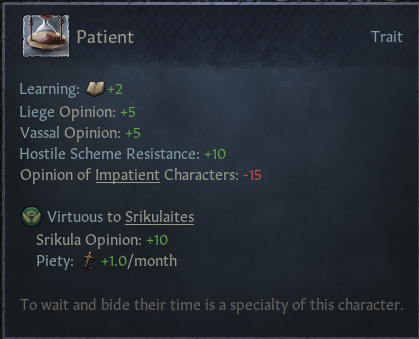
Ever heard of the saying “Patience is a virtue”?
Well in CK3 it apparently isn’t. No major faith considers patience a virtue apparently.
However, providing a decent boost to your learning, an opinion boost to your vassals, as well as resistance towards hostile schemes, patience makes it to this list’s top.
The vassal opinion boost is simply invaluable, safeguarding you from ambitious factions. Patience is also not looked upon negatively by any culture or faith, essentially providing zero disadvantages.
3. Callous
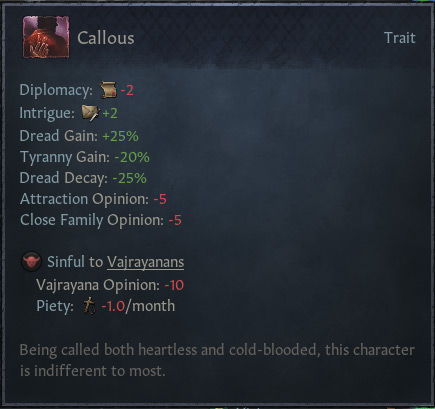
The callous trait is another one pushing your gameplay to a tyrannical one. Mutually exclusive with Sadistic, so you can’t have both on the same character!
The reduced Tyranny gain is by far the highlight. Paired with certain lifestyle paths, you can have a tyrant of a character without constantly having to deal with rebellions.
Not considered a sin in Abrahamic faiths and providing no relevant maluses to opinion, callousness is a trait that enables a unique way of playing.
Set your character up correctly and you will be able to engage in tyrannical actions far more frequently than most characters.
2. Just
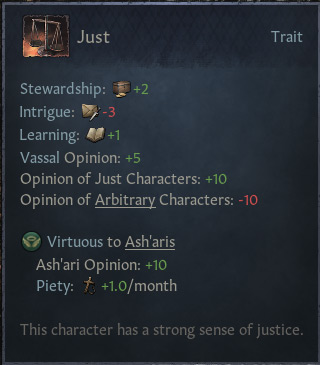
The Just trait essentially locks your playstyle for the given character into a streamlined, upfront, non-scheming one.
This might pose some problems, stressing you out if you need to absolutely scheme against your enemies. However, it’s nothing significant and can be alleviated by stress-reducing activities and event choices.
The bonus to vassal opinion as always is valued very much, while the trait is looked upon favorably by many large Cultures like Greek.
It’s also a virtue in Islam, boosting your vassals’ opinion of you even further if following one of the Muslim faiths.
The malus to intrigue is not negligible and can be a problem if you have lots of enemies. However, the playstyle encouraged by the Just trait should ensure you do not make many enemies. Furthermore, a good, loyal spymaster always is the most important thing when protecting yourself from schemes.
1. Brave
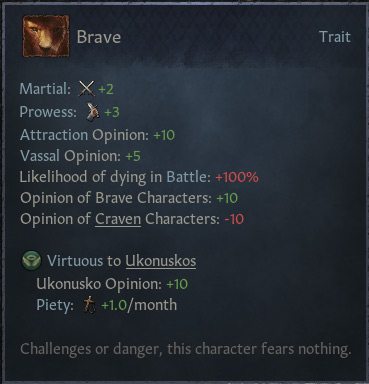
Brave gets the first spot on this list since its bonuses are applicable in all situations in the game.
The extra martial and prowess are always welcome, while the vassal opinion is one of the strongest modifiers one can ask for. On top of that, the attraction opinion provided helps immensely with vassals of the opposite sex.
The only real malus provided by the brave trait is the increased chance to get captured or die in battle.
This is offset partially by the increased prowess, however. Remember, there is always the option of not leading your armies in battle yourself!
The event choices it provides are usually positive, while the hunting activity reduces your stress more than it normally does.
The brave trait is considered a virtue by most pagan faiths, while not looked negatively upon by any faiths or cultures.

